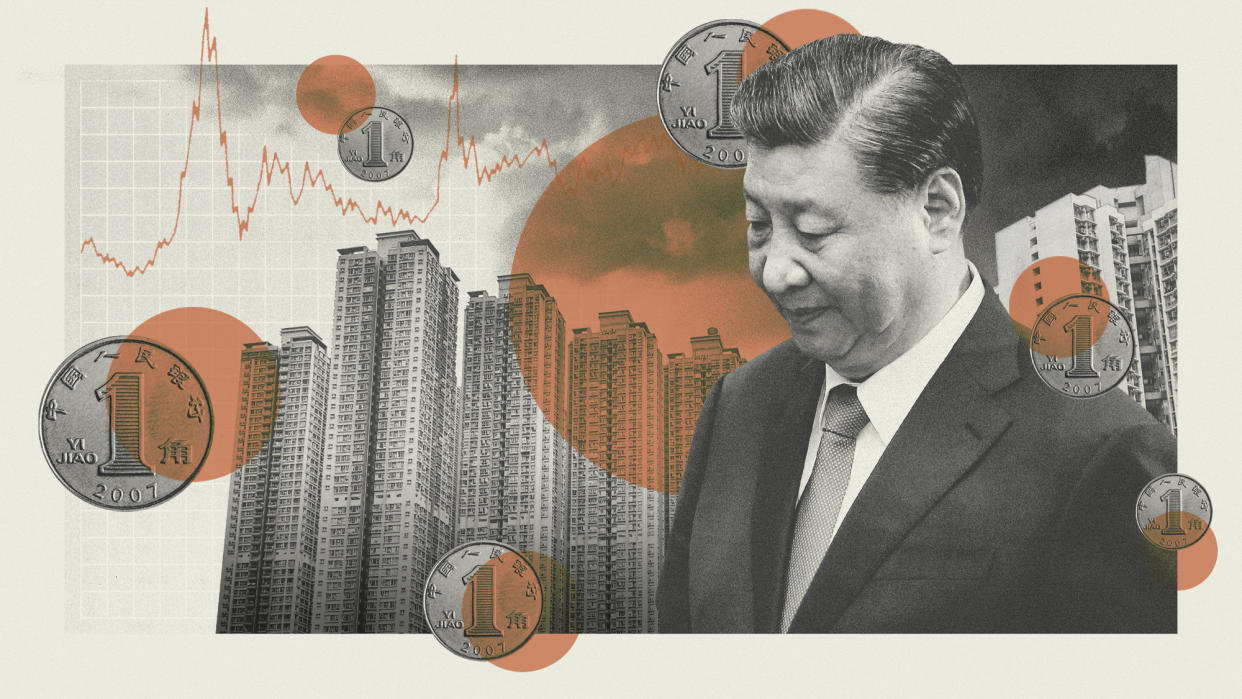Will the economy derail Xi's global plans?

- Oops!Something went wrong.Please try again later.
China's economy faces a turbulent start to 2024 as declining stock markets and a prolonged slump in the property sector threaten to stymie Xi Jinping's grand plans on the world stage.
In the first three weeks of January, mainland China's CSI 300 Index dropped by 6%, the Shanghai Composite Index by 7% and Hong Kong's Hang Seng Index fell by over 12%, "reaching its lowest level in two decades", said Foreign Policy's China Brief newsletter writer James Palmer.
President Xi harbours ambitions to "make China great again" and position the nation as the foremost global power by 2049, said Katie Stallard, senior editor for China at The New Statesman . His vision involves a Sino-centric world order where China supersedes the US. Beijing would then invite the US to participate in a proposed "Pax Sinica", or "Chinese peace", provided Washington recognised China's leading role.
But the market slump has "dampened Beijing's recent efforts to paint a rosy picture of economic recovery", said Palmer, and has come as a "psychological shock" to both the Chinese government and public.
What did the commentators say?
The Chinese government reported a 5.2% GDP growth in 2023, but those figures have been questioned by some analysts outside the country, with some estimating growth as low as 1.5%. China's property market, a "critical barometer" for the economy, said Foreign Policy's Palmer, is "doing just as badly", with new home prices, investment and sales all falling in 2023.
Sentiment towards China is "so bleak that investors are at a loss as to what needs to happen – both domestically and externally – for a meaningful and durable rally to take hold", wrote sovereign debt expert Nicholas Spiro for the South China Morning Post.
That has not deterred Xi's administration, which has introduced a "slew" of initiatives in the first few weeks of this year to attract foreign investors and stimulate domestic consumption, said Time.
But "acting as a seemingly ever-present counterweight" to China's economic ambitions is "a parallel set of ambitious policies" by the Chinese Communist Party (CCP) that are designed to improve and protect Chinese society.
One notable instance was China's recent attempt to crack down on gaming addiction among Chinese youth. The speculation over impending curbs on China's largest gaming companies "rattled the stock market so much that one day later, authorities hurriedly vowed to revise the draft regulations they had just introduced", said Time.
In terms of foreign policy, through a subtle approach and consensus building, Xi is positioning China as "the leader of a new multipolar order", sub-Saharan geoeconomic analyst Aly-Khan Satchu told the South China Morning Post.
China's Belt and Road initiative has "addressed some of the projected infrastructure investment gap in the Global South", said The Diplomat, but has also "sparked significant geopolitical and geoeconomic competition between China and the US". Xi's pronouncement earlier this month that China's reunification with Taiwan was "inevitable" caused further consternation in Washington.
Despite the blows to his economic credibility, Xi "appears convinced that he alone can solve the country’s problems", said The New Statesman's Stallard.
With his political doctrine firmly entrenched within the CCP, and a decade of carefully consolidated authority, any potential removal would require a profound rupture within the party or a severe health crisis. Xi and his vision for his country are likely to "dominate Chinese politics for years, perhaps decades to come", Stallard added.
What next?
The economic scenario now facing China is "a far cry" from how Xi "thought Asia's biggest economy would enter 2024", said Forbes. Despite last year's significant challenges, including the severe property crisis and record youth unemployment, Beijing "exuded great confidence that momentum would return".
"On the surface, Xi could point to news China grew an annualized 5.2% last year to try to make that case," added the news site. But lurking beneath the surface are "deflationary pressures" that are "festering in alarming ways".
China could be on the verge of "Japanization", a term that refers to Japan's prolonged period of low growth and deflation after its economic bubble burst in the late 1990s.
"All the talk of China becoming the world's largest economy by GDP has been put on the backburner and delayed, if not indefinitely postponed," Josh Lipsky, a former IMF adviser, told Bloomberg.

